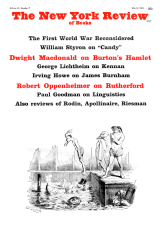In response to:
Relativity Since Einstein from the March 19, 1964 issue
To the Editors:
Philosophical Problems Of Space and Time by Adolf Grünbaum is an extremely important recent contribution to the philosophical literature. It is careful, detailed, and incisive. It fully reveals the unparalleled scholarly and technical competence of its author. Like most technical treatises, its style is not breezy and it is not suited to the “average reader.” For readers with adequate background it provides illuminating analyses of profound issues. The vitriolic attack on this book by Stephen Toulmin, published as a “review” in this magazine on March 19, 1964, is, therefore, difficult to understand.
Things get off to an unfortunate start when a book which devotes the first 337 of its 418 pages to problems which are logically, and for the most part historically, prior to Einsteinian relativity is reviewed under the head, “Relativity Since Einstein.” (To make matters worse, the name of the author is misspelled!) Although Toulmin may not be responsible for the heading of his “review,” he does say that the book “is, in effect, a series of commentaries on the founding-papers of relativity physics.” This cannot fail to foster misconceptions of the nature of the book.
In his first two paragraphs Toulmin sketches his views on the status of the philosophy of space and time, and describes the kind of book he thinks should have been written. For instance, he seems to think that contemporary cosmologists need to be taught some lessons from Kantian philosophy. Be that as it may, Grünbaum set himself an entirely different task, and for this Toulmin proceeds to discuss the book in a most abusive manner.
The “review” is amply supplied with vague and undocumented complaints about style and taste. Grünbaum is berated for use of technical language and for failure to write on a popular level. He is accused of slavish devotion to Einstein and of scholastic method of argument. Indeed—ignoring any distinction between physical theory and philosophical analysis—Toulmin bemoans the fact that Grünbaum is not a new Galileo. In not one single case, however, does Toulmin take issue with any argument Grünbaum presents or point to any technical inaccuracy.
Toulmin does take specific exception to Grünbaum’s discussions of Whitehead and Milne. He does not suggest that the treatments are inaccurate, but only ungenerous. In each case Grünbaum has extensively documented his interpretation. What Toulmin takes to be admission on Grünbaum’s part of the unfairness of his treatment of these two authors turn out to consist of Grünbaum’s bending over backward to give them every benefit of doubt.
In the final paragraph Toulmin attempts to assess the underlying motives responsible for the defects he has complained of. He claims—completely gratuitously—that Grünbaum wants to regard present science as final and infallible, and that he wants to deny current science its conceptual heritage. This attribution of motives is utterly unfounded. Grünbaum says no such thing in his book or anywhere else. He tries, it is true, to avoid confusing historical research with logical analysis, but surely this does not entail a denial of either. It is a great pity that Grübaum’s valuable work did not receive a more responsible review.
Wesley C. Salmon
Professor of Philosophy of Science
Indiana University
Stephen Toulmin replies:
I cannot accept Wesley Salmon’s reproaches. The severity of his language should make anyone search his conscience, and I have naturally done so. But neither I nor the colleagues I have consulted can recognize his description of my view. On the contrary, many people have read the piece as basically flattering to Grünbaum: certainly I took him deeply seriously, tried to place his work in the perspective of intellectual history, treated him as a master of his subject and judged him against the highest standards. (Why does Salmon deplore my comparing Grünbaum’s work with Galileo’s? There’s a compliment for you!) Nor can I, in this context, accept a hard-and-fast division between philosophical analysis and physical theory. In relativity-theory particularly, conceptual and empirical issues are closely interwoven, and most of the people Grünbaum considered were writing both as physicists and as philosophers. This fact, after all, is what gives a book like Grünbaum’s a relevance and interest to readers outside the guild of professional philosophers—both scientists and “general readers.”
Salmon’s main complaint, indeed, just is that I appraised the book from the point of view of the general reader, instead of elaborating on my technical criticisms. Yet it was The New York Review of Books I was writing for, not (say) the Philosophical Review. Under the circumstances, I was surely obliged to consider the book first and foremost as a contribution to our common intellectual tradition, and this left room for me only to state my professional opinion about the technical standing of Grünbaum’s arguments. If, instead, I had filled my allotted space with detailed counter-arguments, I should have failed in my responsibilities as a reviewer.
As to the tone of my remarks, which evidently offended Salmon: I can only ask him to believe that his judgment is not generally shared. “One man’s irony is another man’s vitriol.”
This Issue
May 14, 1964



